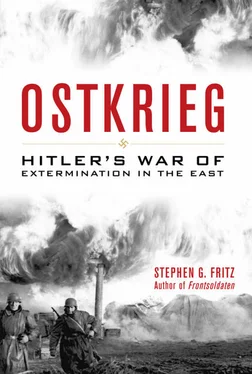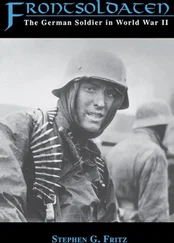In the event, a combination of bad weather and Hitler’s own doubts about the original plan of attack led to a postponement of the assault on France until the following spring. During the course of the long winter, the so-called Phony War, or Sitzkrieg , German plans changed substantially. Despite considerable opposition among top commanders, the audacious idea of General Erich von Manstein, chief of staff of Army Group A, to send motorized units in a surprise attack through the Ardennes in order to cut off the enemy’s main body of troops began to gain converts. First General Heinz Guderian, the leading German tank expert, and then Halder himself embraced Manstein’s plan. Since Hitler had been thinking, albeit in vague tactical terms, along similar lines, he also proved an enthusiastic supporter of the conception.
The brilliance with which Operation Sichelschnitt (Sickle Cut) unfolded in May and June 1940 has obscured several key points that accounted for its success. The decisive German victory resulted not from a premeditated strategy of blitzkrieg eagerly embraced by Wehrmacht leaders, but in spite of their doubts, hesitations, and obstructions. Indeed, the plan worked largely as a result of the calculated insubordination of the leading panzer general, Guderian, and the willingness of Halder to take enormous risks. In operational terms, Sickle Cut depended for success on the all-or-nothing gamble of concentrating all available German forces at the key Schwerpunkt (focal point of an attack) for a decisive knockout blow and counting on the enemy cooperating by doing as he should. In strategic terms, it represented the ultimate risk: the German nightmare of being strangled in a slow war of attrition would be resolved with a single throw of the dice. Win, and Germany would break free of the specter of encirclement and blockade; lose, and the result would be catastrophe. Far from being the result of a rational plan of blitzkrieg strategy that would enable Germany to achieve Lebensraum in a series of small wars, Sickle Cut was an act of operational expediency designed to extract Germany from an economically and strategically desperate situation. The country had gone to war in 1939 seriously short of raw materials and unprepared economically to sustain a long war; success in the west had bought needed time. 47
Although initially planned or projected not as a blitzkrieg operation but as a conventional conflict similar to the Great War, the unexpected victory over France had significant consequences for German thinking. The new Greater Germany now constituted a formidable economic bloc, but, once the initial elation wore off, German economic planners realized that the area under their control suffered from serious deficiencies and was not the self-sufficient Lebensraum that Hitler desired. Foremost among these deficiencies, and almost perversely designed to rekindle nightmares of blockade and crippling shortages, were shortfalls in foodstuffs and energy. Despite their conquest of an area rich in skilled labor, technology, and sophisticated industrial plant, the Germans found themselves starved of food, coal, and oil. The food requirements of some 25 million people had to be imported, and that was just the peacetime deficit: the British blockade was bound to aggravate the situation, especially since food supplies were already running short in 1940. One bad harvest, the Nazis feared, could again trigger unrest and defeatism on the order of 1917–1918. Far from being blockade proof, Nazi war economists realized, Western Europe lacked a “spare feeding capacity.” 48
While their short-term gains had been immense, particularly in terms of war booty seized from the French, Nazi authorities found themselves faced with the task of supplying not only the needs of Germany but also those of the allied and occupied areas. Ironically, rather than immediately reaping the economic benefits of conquest, the Nazis were forced to export oil, coal, and foodstuffs from outside Germany. The most persistent and troubling shortage continued to be in oil, although the dire food situation in the fall and winter of 1940–1941 raised fears of unrest in the occupied urban centers. In economic terms, the Wehrmacht’s great victory in 1940 had not released it from dependence on deliveries from the Soviet Union, nor had it given the Greater German Reich resources comparable to those of the British Empire or the United States. 49
Strategically and operationally, however, the situation looked rather different. After the triumph in the west, a blitzkrieg myth emerged; once again, as in the days before World War I, German military thinkers began to believe that quick, operational victories could solve the nation’s strategic dilemma. Perhaps Lebensraum could be achieved without fighting bloody wars of attrition after all. Only one problem remained: for all the celebration surrounding the defeat of France, the other enemy, Great Britain, stubbornly refused to come to terms. This obstinacy, moreover, now threatened a fundamental alteration in the balance of power in Europe, a change Hitler began to perceive during the summer of 1940. The fall of France, far from ensuring German hegemony on the Continent, turned a European conflict into a potential world war as both the United States and the Soviet Union emerged as key factors. For Britain, survival as a great power required continuing in the war. Doing so, however, meant enlisting the support of the United States and perhaps eventually that of the Soviet Union as well. In any case, Stalin had already moved quickly to take advantage of his leverage vis-à-vis Germany in Eastern Europe. Such a scenario clearly posed a problem for the Third Reich. 50Despite its spectacular military triumph of the spring, Nazi Germany still faced a strategic, economic, and racial impasse. Hitler, in Paris, had been correct: the war was not yet ended.
At 3:00 P.M. on 6 July 1940, under a glittering early summer sun, an unadorned train pulled slowly into the Anhalter Bahnhof in Berlin amid scenes of jubilation and pure joy unequaled in German history. People had been gathering in the flower-strewn streets of the capital since early morning, many waiting over six hours for a chance to glimpse the Führer. “An unimaginable excitement filled the city,” exulted Joseph Goebbels in his diary, overcome by the festive mood of the “sea of humanity” that thronged the avenues. After a short discussion with Goering, who feared a British air attack on the city, Goebbels exclaimed, “Then the Führer arrived. A wild enthusiasm filled the train station. The Führer is deeply moved. Tears come to his eyes…. The storm of jubilation of a completely joyous people is indescribable. The Führer drove [to the Reich Chancellery] completely over flowers.” Once there, as Field Marshal Keitel lauded him as “the greatest military commander of all time,” Hitler soaked in the adulation of the wildly cheering throng below. For perhaps the only time during the Third Reich, Germans evinced a genuine enthusiasm for the war, sensing as they did that final victory was at hand. 1
Even at this moment of ultimate triumph, however, disquieting notes of uneasiness intruded, as evidenced by Goering’s fears. Goebbels also betrayed a host of concerns nestled amid the triumphalism. “Even in Germany we have rather too much as too little optimism,” he wrote on 9 June. “One takes the victory too lightly.” Throughout this period of historic triumph, in fact, the propaganda minister kept an anxious eye on the two peripheral powers of great concern, noting both American attitudes and Russian actions. Above all, he took note of the inflammatory reports of the “Jewish press” in America designed to create, in his opinion, an atmosphere of hate toward Germany that would force President Roosevelt, whom he regarded as a stooge of the alleged Jewish conspiracy, to intervene in European affairs. The rapid German triumph, however, eased his fears of direct American action against Germany, at least until after the November presidential election. 2
Читать дальше












